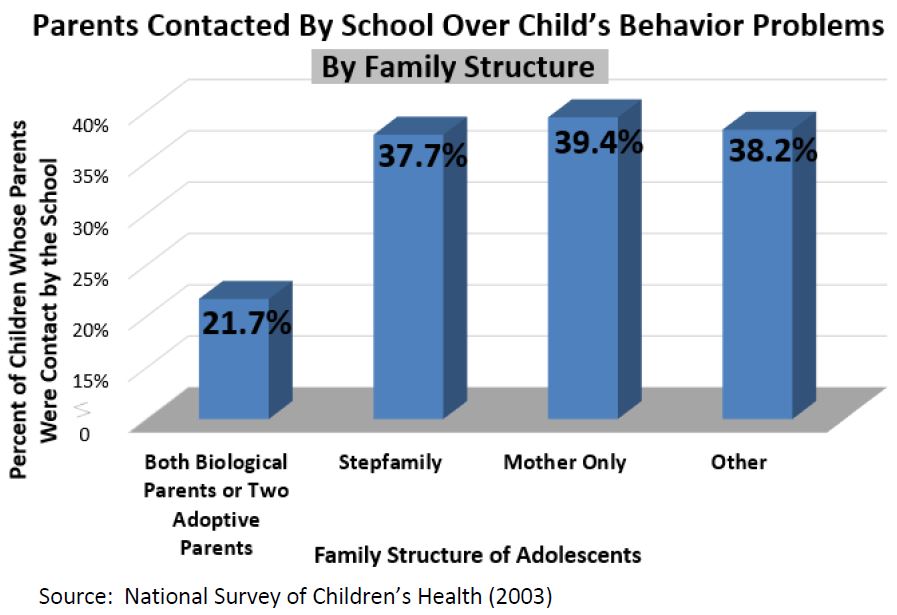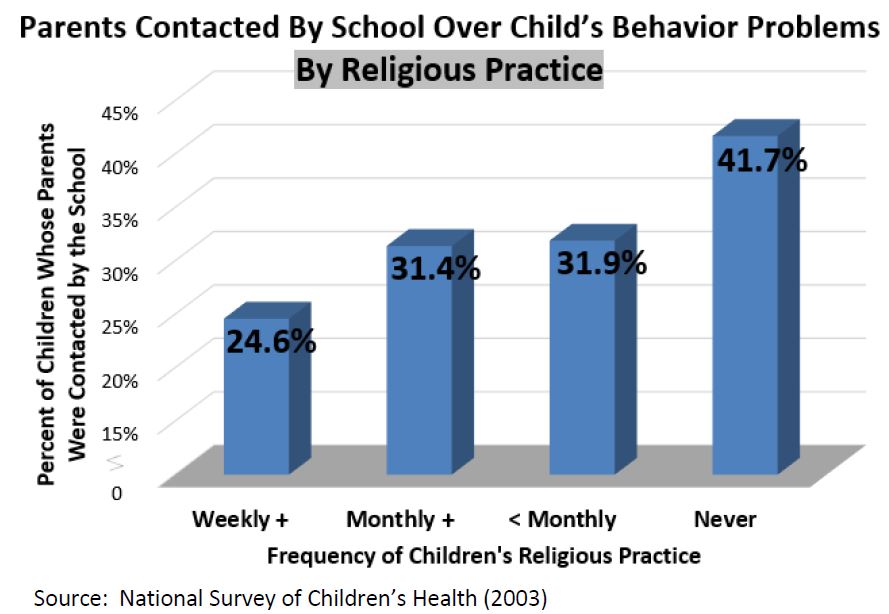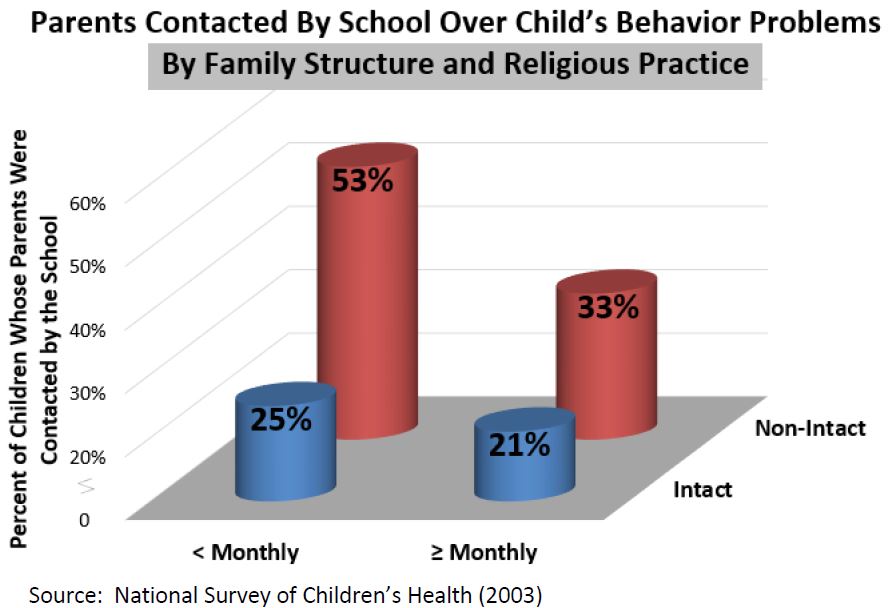Click Here to download “Parents Contacted By School Over Child’s Behavior Problems by Family Structure and Religious Practice”
Parents Contacted By School Over Child’s Behavior Problems by Family Structure and Religious Practice
Family Structure: Only 21.7 percent of children who lived with both biological parents or with two adoptive parents had their parents contacted by their school to report behavior problems, compared to 39.4 percent of children who lived with single mothers. In between were those who lived with a biological parent and a stepparent (37.7 percent)
[1] and those who lived within other family configurations (38.2 percent), such as with their father only or foster parents.
[2]
 Religious Practice:
Religious Practice: Only 24.6 percent of children who worshipped at least weekly had their parents contacted by their school to report behavior problems, whereas 41.7 percent of children who never worshipped had their parents contacted by their school. In between were children who worshipped one to three times a month (31.4 percent) and children who attended religious services less than once a month (31.9 percent).
 Family Structure and Religious Practice Combined:
Family Structure and Religious Practice Combined: Only 21 percent of children who worshipped frequently and lived with both biological parents or with two adoptive parents had their parents contacted by their school to report behavior problems, compared to a much larger 53 percent for children who worshipped less than monthly and lived in single-parent or reconstituted families. In between were those who lived in intact families and worshipped less than monthly (25 percent) and those who lived in non-intact families who worshipped at least monthly (33 percent). The data were taken from the National Survey of Children’s Health.
 Related Insights from Other Studies:
Related Insights from Other Studies: Several other studies corroborate the direction of these findings. Byron Johnson of Baylor University and colleagues examined delinquency data from the National Youth Survey, which included measures such as “hit students,” “hit teacher,” “damaged school property,” and “skipped classes.” They reported that adolescent religiosity corresponded to fewer instances of delinquency and that adolescents who lived in intact families were less likely to acquire delinquent friends.
[3]
John Bartkowski of Mississippi State University and colleagues also found that both parents’ frequent religious attendance correlated with several positive child behavior outcomes, such as greater self-control and a reduced probability of “externalizing problem behaviors at school.”
[4]
[1] Most of the parents in the “biological parent and a stepparent” category are married.
[2] “Other family configurations” also include children living with grandparent or other relatives.
[3] Byron R. Johnson, et al., “Does Adolescent Religious Commitment Matter? A Reexamination of the Effects of Religiosity on Delinquency,”
Journal of Research in Crime and Delinquency, vol. 38 (2001): 22-44.
[4] John P. Bartkowski, et al., “Religion and Child Development: Evidence from the Early Childhood Longitudinal Study,”
Social Science Research, vol. 37 (2008): 18-36.
]]>
 Religious Practice: Only 24.6 percent of children who worshipped at least weekly had their parents contacted by their school to report behavior problems, whereas 41.7 percent of children who never worshipped had their parents contacted by their school. In between were children who worshipped one to three times a month (31.4 percent) and children who attended religious services less than once a month (31.9 percent).
Religious Practice: Only 24.6 percent of children who worshipped at least weekly had their parents contacted by their school to report behavior problems, whereas 41.7 percent of children who never worshipped had their parents contacted by their school. In between were children who worshipped one to three times a month (31.4 percent) and children who attended religious services less than once a month (31.9 percent).
 Family Structure and Religious Practice Combined: Only 21 percent of children who worshipped frequently and lived with both biological parents or with two adoptive parents had their parents contacted by their school to report behavior problems, compared to a much larger 53 percent for children who worshipped less than monthly and lived in single-parent or reconstituted families. In between were those who lived in intact families and worshipped less than monthly (25 percent) and those who lived in non-intact families who worshipped at least monthly (33 percent). The data were taken from the National Survey of Children’s Health.
Family Structure and Religious Practice Combined: Only 21 percent of children who worshipped frequently and lived with both biological parents or with two adoptive parents had their parents contacted by their school to report behavior problems, compared to a much larger 53 percent for children who worshipped less than monthly and lived in single-parent or reconstituted families. In between were those who lived in intact families and worshipped less than monthly (25 percent) and those who lived in non-intact families who worshipped at least monthly (33 percent). The data were taken from the National Survey of Children’s Health.
 Related Insights from Other Studies: Several other studies corroborate the direction of these findings. Byron Johnson of Baylor University and colleagues examined delinquency data from the National Youth Survey, which included measures such as “hit students,” “hit teacher,” “damaged school property,” and “skipped classes.” They reported that adolescent religiosity corresponded to fewer instances of delinquency and that adolescents who lived in intact families were less likely to acquire delinquent friends.[3]
John Bartkowski of Mississippi State University and colleagues also found that both parents’ frequent religious attendance correlated with several positive child behavior outcomes, such as greater self-control and a reduced probability of “externalizing problem behaviors at school.”[4]
[1] Most of the parents in the “biological parent and a stepparent” category are married.
[2] “Other family configurations” also include children living with grandparent or other relatives.
[3] Byron R. Johnson, et al., “Does Adolescent Religious Commitment Matter? A Reexamination of the Effects of Religiosity on Delinquency,” Journal of Research in Crime and Delinquency, vol. 38 (2001): 22-44.
[4] John P. Bartkowski, et al., “Religion and Child Development: Evidence from the Early Childhood Longitudinal Study,” Social Science Research, vol. 37 (2008): 18-36.
]]>
Related Insights from Other Studies: Several other studies corroborate the direction of these findings. Byron Johnson of Baylor University and colleagues examined delinquency data from the National Youth Survey, which included measures such as “hit students,” “hit teacher,” “damaged school property,” and “skipped classes.” They reported that adolescent religiosity corresponded to fewer instances of delinquency and that adolescents who lived in intact families were less likely to acquire delinquent friends.[3]
John Bartkowski of Mississippi State University and colleagues also found that both parents’ frequent religious attendance correlated with several positive child behavior outcomes, such as greater self-control and a reduced probability of “externalizing problem behaviors at school.”[4]
[1] Most of the parents in the “biological parent and a stepparent” category are married.
[2] “Other family configurations” also include children living with grandparent or other relatives.
[3] Byron R. Johnson, et al., “Does Adolescent Religious Commitment Matter? A Reexamination of the Effects of Religiosity on Delinquency,” Journal of Research in Crime and Delinquency, vol. 38 (2001): 22-44.
[4] John P. Bartkowski, et al., “Religion and Child Development: Evidence from the Early Childhood Longitudinal Study,” Social Science Research, vol. 37 (2008): 18-36.
]]>
